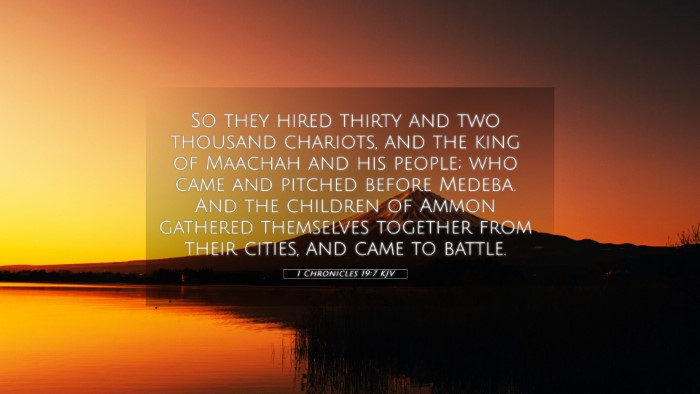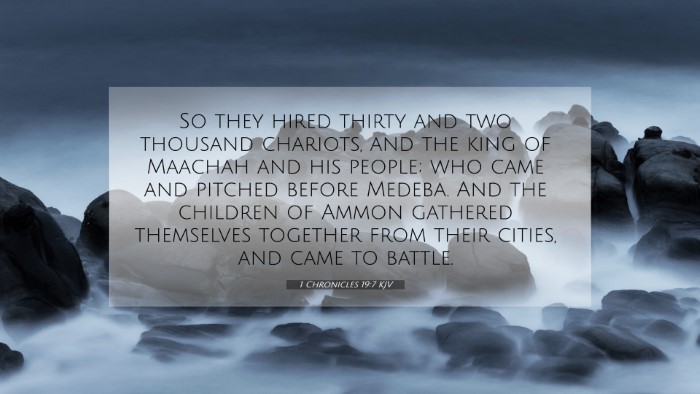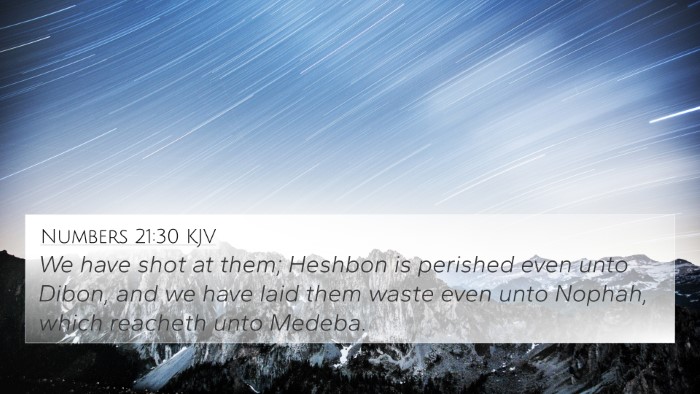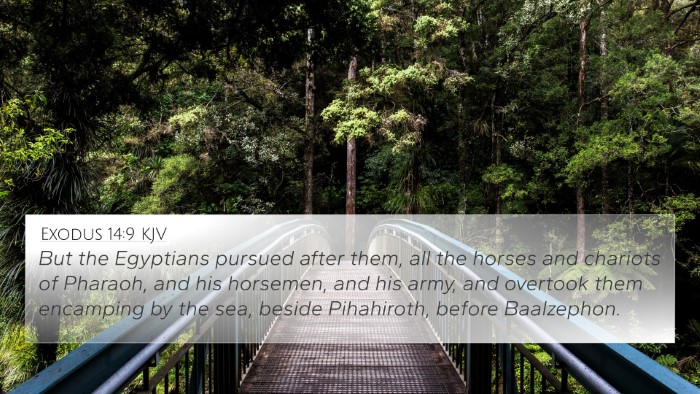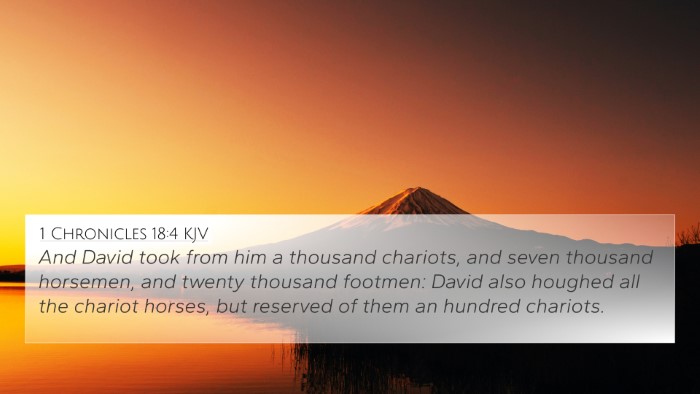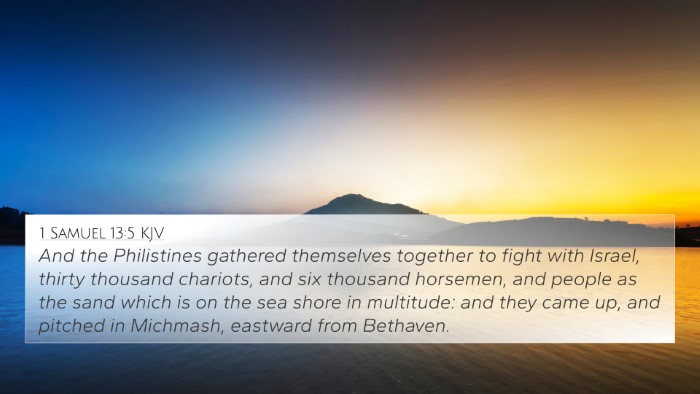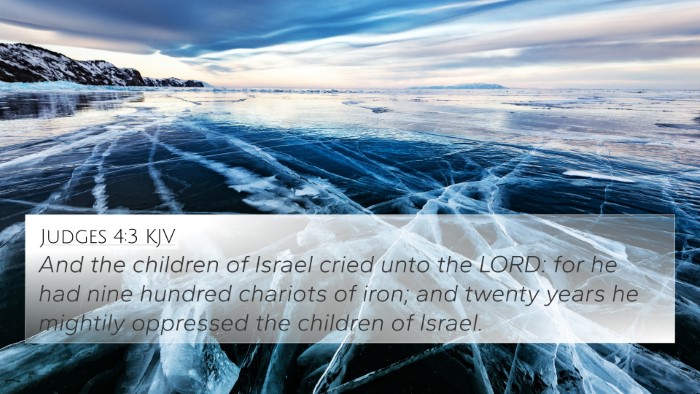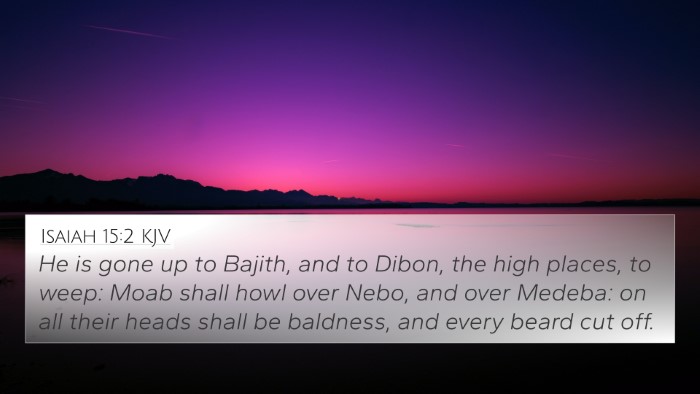Understanding 1 Chronicles 19:7
1 Chronicles 19:7 states:
"So they hired for themselves thirty-two thousand chariots and the king of Maacah and his people; who came and pitched before Medeba. And the children of Ammon gathered themselves together from their cities and came to battle." (1 Chronicles 19:7, KJV)
Summary of the Verse
This verse records a significant military mobilization by the Ammonites, who, unsettled by the death of Saul and the subsequent activities of David, sought to fortify their position against Israel. They hired mercenaries and allied themselves with the king of Maacah, illustrating the increasingly perilous dynamics in the region.
Key Themes and Insights
- Military Alliances: The act of hiring chariots demonstrates a tactical approach to warfare, aiming to strengthen their forces against Israel.
- Preparation for Conflict: The gathering of the Ammonites emphasizes the hostile intent towards David's reign and the desire to challenge Israel's authority.
- Divine Sovereignty: This event illustrates the unfolding of God’s plan for Israel, as seen through David's leadership amidst opposition.
Commentary Insights
Matthew Henry's Commentary
Henry notes that the Ammonite’s actions represent not just a military strategy, but a blatant disregard for the divine favor that had fallen upon David. This mobilization was a desperate move against a king whose throne was established by God.
Albert Barnes’ Notes
Barnes emphasizes the numerical strength of the Ammonites, illustrating that the sheer size of 32,000 chariots was intended to intimidate Israel. He connects this verse with the broader narrative of David's confrontations, highlighting the importance of faith amidst overwhelming odds.
Adam Clarke's Commentary
Clarke elaborates on the geographical significance of Medeba, relating it to the strategic movements within the context of Israel's historical campaigns. He also notes the symbolic implications of such alliances, reflecting the ongoing conflicts that Israel faced during its formative years.
Related Bible Verses and Cross-References
- 2 Samuel 10:6: "And when the children of Ammon saw that they had made themselves odious to David, Hanun and the children of Ammon sent a thousand talents of silver to hire them chariots and horsemen." This verse directly connects the Ammonites’ strategy of hiring military assistance.
- 1 Chronicles 19:1: "Now it came to pass after this that Nahash the king of the children of Ammon died, and his son reigned in his stead." This provides context for why the Ammonites felt threatened, framing the subsequent actions.
- Psalm 60:4: "Thou hast given a banner to them that fear thee, that it may be displayed because of the truth." This hints at the divine support for Israel amid conflict.
- 1 Samuel 11:1: "Then Nahash the Ammonite came up, and encamped against Jabeshgilead." This historical parallel showcases ongoing tensions between Israel and Ammon.
- Deuteronomy 20:1: "When thou goest out to battle against thine enemies, and seest horses, and chariots, and a people more than thou, be not afraid of them; for the Lord thy God is with thee." This is a reminder of God's assurances in times of battle.
- 2 Chronicles 20:15: "And he said, Hearken ye, all Judah, and ye inhabitants of Jerusalem, and thou king Jehoshaphat; Thus saith the Lord unto you, Be not afraid nor dismayed by reason of this great multitude; for the battle is not yours, but God’s." This underscores the theme of divine intervention in warfare.
- Isaiah 31:1: "Woe to them that go down to Egypt for help; and stay on horses, and trust in chariots, because they are many; and in horsemen, because they are very strong; but they look not unto the Holy One of Israel, neither seek the Lord!" This verse cautions against reliance on worldly strength.
Conclusion
The events in 1 Chronicles 19:7 symbolize more than a historical account of warfare; they present themes central to the biblical narrative such as divine sovereignty, the human inclination to rely on military strength, and the struggles faced by God’s chosen people. In studying this verse, one can utilize various tools for Bible cross-referencing to explore deeper connections and develop a more enriched understanding of scriptural themes and the unfolding story of Israel, both in the Old and New Testaments.
Using Cross-References and Comparative Analysis
For those interested in how to find cross-references in the Bible, a systematic approach can prove beneficial. By attending to the connections established in these verses, readers can gain insights into the thematic Bible verse connections that run throughout Scripture. Engaging in bible cross-reference study aids, such as concordances and thematic analyses, will enhance understanding and foster a deeper engagement with Biblical texts.
Further Bible Study Tools
- Bible Concordances: Useful for finding specific verses and their connections across the scripture.
- Bible Cross-Reference Guides: Provide structured references that help track themes and narratives throughout the Bible.
- Cross-reference Bible Study Methods: Employ comparative study techniques to explore contextual similarities.

